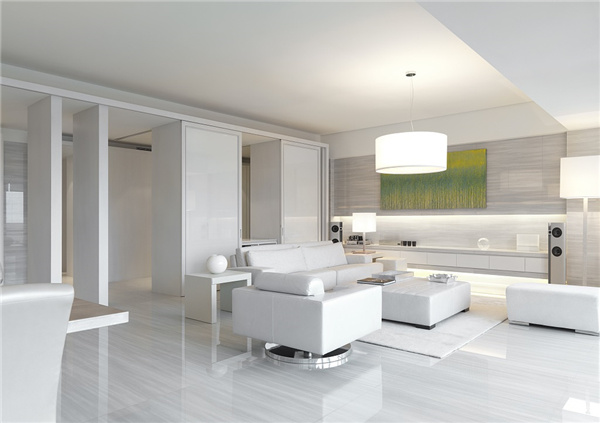Ceramic tiles have become a popular flooring option for those seeking an allergen-free living environment. With allergies affecting millions of people worldwide, understanding the impact of allergens on health is crucial. This article aims to provide a comprehensive guide on ceramic tiles and their benefits for allergy sufferers.
Firstly, we will explore the concept of allergens and their potential health implications. Allergens, such as dust mites, pet dander, and pollen, can trigger allergies and respiratory issues in susceptible individuals. Ceramic tiles offer advantages in minimizing the accumulation of these allergens, making them a desirable choice for allergy sufferers.
Next, we will delve into the benefits of ceramic tiles for allergy sufferers. Their smooth and non-porous surface makes it difficult for allergens to settle and linger, reducing the risk of allergic reactions. Additionally, ceramic tiles are easy to clean and maintain, making them an ideal choice for maintaining an allergen-free environment.
Furthermore, this article will guide readers on selecting the right ceramic tiles for their homes, as well as provide tips on cleaning and maintaining them. We will also compare ceramic tiles to other flooring options to help readers make an informed decision.
Ultimately, this article aims to equip readers with the necessary knowledge and expert tips for installing ceramic tiles to create an allergen-free living space.
Understanding the role of allergens and their potential effects on health is crucial for maintaining an allergen-free living environment.
Allergens are substances that can trigger an allergic reaction in susceptible individuals. They can be found in various forms, such as pollen, dust mites, pet dander, mold spores, and certain foods.
When these allergens come into contact with the body, they can cause symptoms ranging from mild irritation to severe allergic reactions. Allergic reactions can manifest as respiratory symptoms, skin rashes, itching, and even life-threatening anaphylaxis.
It is important to note that allergens can accumulate on surfaces, including ceramic tiles, making regular cleaning and maintenance essential in reducing allergen exposure. Choosing ceramics tiles that are easy to clean and resistant to mold and mildew can further contribute to creating an allergen-free living environment.

Consequently, individuals afflicted with allergies can benefit greatly from the installation of ceramic tiles due to their inherent hypoallergenic properties.
Ceramic tiles are an excellent choice for allergy sufferers for several reasons. Firstly, ceramic tiles have a smooth and hard surface that does not attract or retain allergens such as dust mites, pollen, or pet dander. This makes it easier to clean and maintain a healthy and allergen-free environment.
Secondly, ceramic tiles are resistant to mold and mildew growth, which are common triggers for allergies. Their non-porous nature prevents moisture absorption, reducing the risk of mold development.
Lastly, ceramic tiles do not emit volatile organic compounds (VOCs), which can worsen allergies. This is particularly important for individuals with chemical sensitivities.
Overall, the use of ceramic tiles in living spaces can contribute significantly to minimizing allergen exposure and promoting a healthier living environment for allergy sufferers.
When selecting ceramic tiles for your home, it is important to consider factors such as color, texture, and size in order to achieve the desired aesthetic and functionality.
The color of the tiles can greatly impact the overall look of a room. Lighter colors can create a sense of openness and brightness, while darker colors can add depth and warmth.
Texture is another important consideration, as it can affect both the look and feel of the tiles. Smooth tiles can give a sleek and modern appearance, while textured tiles can provide a more rustic or natural look.
Additionally, the size of the tiles can also play a role in the overall design. Larger tiles can make a small space appear larger and more spacious, while smaller tiles can create a more intricate and detailed look.
By carefully considering these factors, you can choose the right ceramic tiles that will enhance the aesthetic and functionality of your home.

To ensure a hygienic and allergen-free living environment, regular maintenance and cleaning of ceramic tiles is essential.
Ceramic tiles are a popular choice for flooring due to their durability, water resistance, and aesthetic appeal. However, they can accumulate dirt, dust, and allergens over time, which can pose a risk to individuals with allergies or respiratory conditions.
To maintain a clean and allergen-free surface, it is important to sweep or vacuum the tiles regularly to remove loose dirt and debris. Additionally, mopping the tiles with a mild detergent and warm water can effectively remove stains and germs.
It is crucial to avoid using harsh cleaning products or abrasive materials that can damage the tiles' surface.
By following these cleaning practices, ceramic tiles can provide a safe and healthy living environment for individuals with allergies.
Creating an environment that is free from allergens can be achieved by utilizing the hygienic and durable nature of ceramic tiles. These tiles offer several advantages in creating an allergen-free living space:
- Resistance to allergens: Ceramic tiles have a smooth and non-porous surface, which makes it difficult for allergens such as dust mites, pollen, and pet dander to adhere to them. Regular cleaning and maintenance ensure that these allergens are easily removed, promoting a healthy living environment.
- Low VOC emissions: Volatile Organic Compounds (VOCs) are known to contribute to indoor air pollution and can trigger allergies. Ceramic tiles have low VOC emissions, making them a suitable choice for creating an allergen-free environment.
- Resistance to mold and mildew: Ceramic tiles are resistant to moisture, preventing the growth of mold and mildew. This is particularly important for individuals with allergies or respiratory conditions, as mold and mildew can exacerbate symptoms.
By incorporating ceramic tiles into your living space, you can create an environment that not only looks aesthetically pleasing but is also allergen-free and promotes better indoor air quality.

Ceramic tiles offer distinct advantages over alternative flooring options in terms of allergen resistance, low VOC emissions, and resistance to mold and mildew.
Compared to carpeting, ceramic tiles provide a smooth and non-porous surface that does not trap dust, pollen, or other allergens. This makes them an excellent choice for individuals with allergies or asthma.
Furthermore, ceramic tiles have low volatile organic compound (VOC) emissions, which means they do not release harmful chemicals into the air. This is particularly important for indoor air quality and overall health.
Additionally, ceramic tiles are highly resistant to mold and mildew growth, as they are not a suitable environment for these microorganisms to thrive. This further contributes to a cleaner and healthier living environment.
Overall, ceramic tiles are a superior flooring option for those seeking an allergen-free home.
Installing ceramic tiles for an allergen-free living environment requires careful consideration of factors such as proper subfloor preparation, appropriate adhesive selection, and precise tile placement techniques. These expert tips can help ensure a successful installation that minimizes allergen exposure in the home:
- **Subfloor preparation**: Thoroughly clean and level the subfloor to create a smooth and stable surface for tile installation.
- **Adhesive selection**: Choose a low-VOC adhesive that is specifically designed for ceramic tiles to minimize the release of allergens into the air.
- **Tile placement**: Use a tight grout joint and ensure proper alignment to prevent the accumulation of dust and allergens between tiles.
- **Sealant application**: Apply a suitable sealant to the grout lines to create a barrier that prevents the growth of mold and mildew, reducing potential allergen sources.
By following these expert tips, homeowners can create an allergen-free living environment that is not only visually appealing but also contributes to better indoor air quality and overall well-being.

In conclusion, ceramic tiles offer numerous benefits for individuals seeking an allergen-free living environment.nnTheir smooth and non-porous surface prevents the accumulation of dust, pollen, and other allergens, reducing the risk of allergic reactions.nnFurthermore, ceramic tiles are easy to clean and maintain, ensuring a high level of hygiene.nnCompared to other flooring options, such as carpets, ceramic tiles are a superior choice for individuals with allergies.nnBy following expert tips for installation, one can create a safe and healthy living space using ceramic tiles.